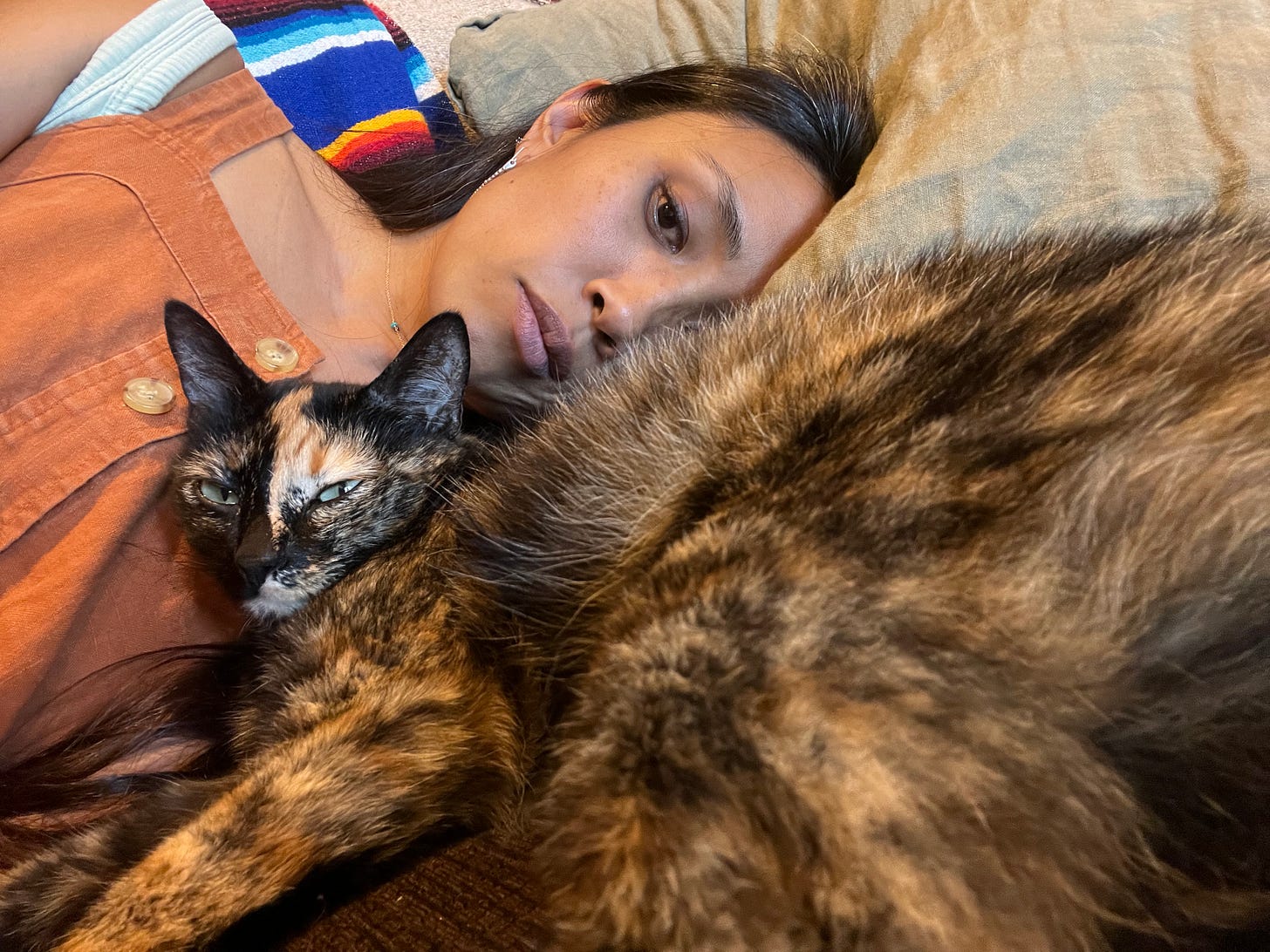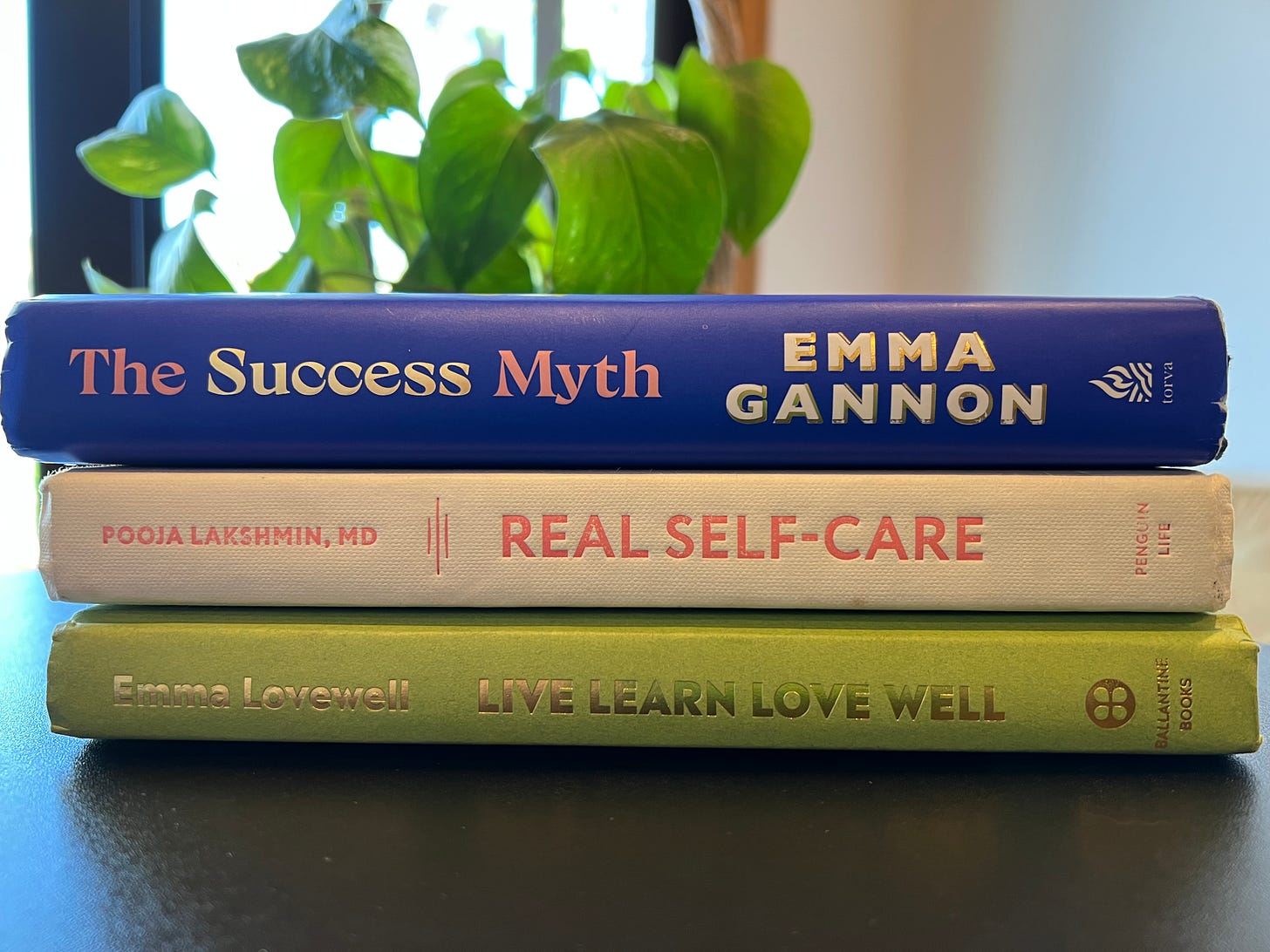Redefine hard work to avoid bed rotting
May include leaning in to loud quitting, a gritty mindset, a new view on ambition, and setting clear boundaries + video of me talking about working 'til midnight, also featuring my dogs
Let me start with the word bed rotting, the gross Gen Z term used to describe doing nothing in bed for a day, or days. Unlike the self-care movement’s “duvet day,” a more tasteful way to describe a rest and reset, it evokes the image of zombie scrolling lying sideways until you turn to compost. The word turns on visceral disgust but I’ve been stuck on the idea for weeks now.
Over the past two months, I’ve read three books related to the self care movement, the exact literature bed rotting is saying f-you to. I am the perfect target market to millennial wellness as I voraciously underlined these books from female writers I admire. Each book’s titles contain key words like, success myth, self-care, love well. Can you picture me now, gobbling up all the chic wellness content? You better believe I was silently preaching, “yaaas queen” as I take mental notes for living life.
After an analysis of the books I’ve consumed, I realized I’ve also clicked, read, commented, shared and actively engaged in many conversations online about the same topics. Clearly, this has been tugging at me.
Based on my chosen reading material and comments on related stories, you’d assume I am anti-bed rotting. I’m team slow living, practically manage the no-phone alliance, and an active member of the anti-social media club!
Yet something about what bed rotting stands for gives me pause.
Can someone like me subscribe to all this health+wellness brouhaha and also feel confident to bed rot?
Ann Helen Petersen of Culture Study deep dived on “Bed Rotting and Loud Quitting” and I soaked up the phenomenon, the evolution of how generations are reevaluating how to live life and work at the same time. The young workforce is no longer quiet quitting, the term used to describe people not going above and beyond at work and just meeting their job description. Workers are now loud quitting. They’re all saying it louder for all the crappy bosses to hear it from their remote desks in the back. This is a widespread response for toxic work culture.
Look, there’s many sides to every story. I very much think there are lazy and entitled workers out there. Other times, this behavior to push back, no matter the volume you wish to do it (loud or quiet), is warranted. I’ve worked with and witnessed unhealthy organizations, many of them during the Lean In era.
I’m a recovering tech PR agency employee and manager who subscribed to the work hard, play hard mentality. I freelanced during the pandemic. I am a mother of 3 kids and, even though I know this is a stupid exercise, I still catch myself trying to “do it all.”
Jenna Park at Everything Is Liminal wrote about her constant effort to find the sweet spot between the grind and bed rotting, to which I relate. Aren’t we all trying to achieve the loaded word, called balance?
Everywhere I read and consume, someone has their take on this sliding scale of caring for themselves and the hustle and grind culture. It’s like we, as a society, don’t know how to find a happy medium.
I believe all this conversation stems from how we’ve taken on and interpret hard work.
In a recent edition of Culture Study, Petersen started a thread on our ideas about hard work, a chance for readers to “reflect: how did you learn about the value of work?”
I believe my idea of "hard work" stems from being a first-generation American. My parents came to the US from the Philippines, father in the Navy for 20 years, my mom fought for the opportunity to go to college, struggled the entire time but graduated with a chemical engineering degree. They came from poverty and she talks about how life back then was "simple but hard."
That is the mantra we grew up with and, as generations pass, we want better for our kids but fear that better means easier and easier means lazy. So we hold onto the idea of "hard work" but it can have varying degrees. I do believe in having grit and understanding the difficult task of practice and patience. But we are finally in a generation that understands hard work at all costs doesn't work for everyone. In fact, it doesn't work for a lot of us…
I spent my 20s and 30s constantly grinding. I worked well beyond 40-hour weeks in my salaried jobs. In 2018, the year before I quit working for someone else, I worked so hard I involuntarily bed rotted. It was the first year of my son’s life and I was sick for the entire year. I’m not joking, from February until December, I was sick in bed for probably 80% of the time until I found out I had been unwell with pneumonia.
Looking back, I wonder if I got so sick because I didn’t rest and worked my ass off at my job, focused on performing. I worked hard at the facade of being a worthy employee to a toxic employer.
My life hinged on this job yet I don’t regret the time and energy I spent there. At the time, it helped pay the mortgage, gave me a sense of worth when I was a mother dealing with an identity crisis in the midst of a bad bout of depression. It also helped me learn what I do not want when it comes to work.
What is hard work?
For some of us, like many children of immigrants, it’s what we do to prove that the sacrifices before us were not forgotten.
But now, I want better for myself.
I also want better for my kids. Does better mean easier? Perhaps it’s a better evaluation of when to work hard, knowing the time and place to persevere. I believe understanding how to do hard work is important. But not everything should be accomplished with it. When we do it, how hard we do it, how much it affects the things we love to do and who we love to be with.
What’s the cliché? Work smarter, not harder. Be choosy about where you have grit and create boundaries.
In the book Real Self-Care by Pooja Lakshmin, MD, she writes: “Our entire system is built on the premise that women’s time—and especially the time of Black and brown women—doesn’t belong to them. Setting boundaries is how we take our time, energy, and attention back.” (Lakshmin, 83)
When I think of how I instill the idea of hard work with my kids, I remember an engaging TED talk, called The Power of Passion and Perseverance. Angela Lee Duckworth, an American academic and psychologist, spoke about what makes successful students. She and other researchers like Stanford University’s Carol Dweck said that “success” has to do with a growth mindset and the child’s belief they have the ability to learn can change with effort.
Duckworth says from the stage, “when kids read and learn about the brain and how it changes and grows in response to challenge, they're much more likely to persevere when they fail, because they don't believe that failure is a permanent condition.”
When we see someone who is hardworking, we tend to call them ambitious. What if we focus our attention, our energy and ambition toward what we’re passionate about, and also rest?
Katie Morwenna of the Sparks newsletter reframed her definition of ambition and I commented on her post: “My ambitions have changed drastically. I am ambitious for rest, a holistic and healthy daily life. I strive for deep relationships and human connection. My ambitions are to feel good in my mind and body. I no longer stress about shattering the glass ceiling and reaching for a career role I never wanted in the first place.”
Back to bed rotting. Because I wanted an excuse to type the grossness a few more times.
I’m constantly in various states of redefining hard work. I still find myself overworking when I work for myself. And you know what? There’s times I want to do absolutely nothing. I have been in many depressive episodes and stared at the wall, which very much felt like wasting away but my body was telling me something, giving me signs I needed to unplug. Sometimes I let myself get swallowed by the vortex of watching YouTube videos and reels and useless crap on social media.
Whatever you want to call it, bed rotting, self-care, duvet day. We all need it because hard work is, well, hard. And this is the flow of life. We work, we rest. We just need to find the middle ground. No guilt, just go ahead and do it.
Emma Gannon said it well in The Success Myth:
“True success is about perfecting the tension between being content with your lot, and also wanting to continue to improve your life. I like the idea of these two things coexisting. Being anti-ambitious in the traditional sense doesn’t have to mean doing nothing — it can actually mean putting a pause on the endless hustle for nebulous goals and having a narrower focus on creating a life with intention.” (Gannon, 234)







For as long as I can remember, one of my mottos has been that life is a compromise. "Having it all" typically equals doing a mediocre job at most things. And I don't think of the word compromise as a negative. It's a realistic view of life that lets us concentrate on what we find most important to achieve. 💜
the lean in era! yes! I totally felt it.